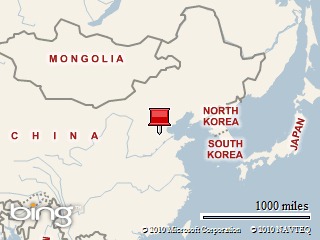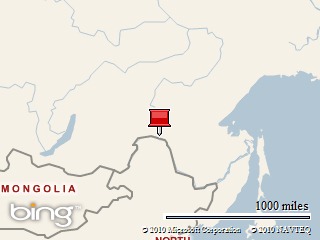April 13, 2008
by Gregory Feifer
Russia's Far East today resembles the old American Wild West: Rolling hills covered by scrubby evergreen forest called the "taiga" stretch endlessly in vast tracts of unsettled land.
In the 1970s, the Kremlin began building the colossal Baikal-Amur railway to help develop the desolate region. North Korea sent prisoners to labor camps in the area to build the railway, but the project was eventually considered one of the great follies of the Soviet era.
Today the project remains unfinished, but nearly 20 years after the Soviet collapse, North Koreans are still logging Russian forests. They're no longer prisoners, but they're still doing dangerous work and remain isolated from the local population.

Barracks-like housing inside a compound for North Korean laborers in the town of Tynda, in Russia's Far East region of Amur. Gregory Feifer, NPR
The Forest's Silent Workers
The snow-bound town of Tynda is the project's main crossroads. A collection of Soviet concrete-slab buildings, Tynda is only 30 years old, but it's already decrepit. At the end of a narrow road, a tall gate blocks the compound entrance that sits next to a guardhouse and a big searchlight. The complex is surrounded by an old wooden fence and a string of rusting barbed wire. Inside, conditions are basic — a red communist North Korean flag flies and prominent banners and monuments bear slogans written in large red Korean characters.
During the Cold war, North Korean prisoners were sent to Tynda to help pay off Pyongyang's debt to Moscow. Today, North Koreans travel here voluntarily and work for private Russian logging companies. Only those in good standing with North Korean authorities are allowed to come.
Occasionally, the gate opens to allow laborers through, usually in groups of three. Walking along the road, they look bedraggled and weather beaten, and they're forbidden to speak to anyone. One worker, who speaks fairly good Russian, says he doesn't want to talk because he doesn't understand the language.
Local residents say the workers keep to themselves.
"When we come across them in the forest, they're afraid of us. We used to feel sorry for them looking very poor, dressed in their black work clothes," says Tynda resident Liudmilla Alexandrovna. "But now we're used to them. After all, their lives here are far better than in North Korea."

North Korean characters mark a building at a logging camp 20 miles south of Tynda. Gregory Feifer, NPR
Backbreaking Work
Logging, one of the main occupations of Russia's Far East, is a poorly regulated industry. Huge volumes of timber are cut illegally and sold cheaply to China, Japan and elsewhere. But most Russians aren't willing to undertake the backbreaking work — legal or illegal. The North Koreans provide a cheap source of labor for the Russian timber companies. They cut and clear wood by hand, without the help of timber harvesters or other heavy machinery.
Estimates of how many North Koreans work in the region vary. One official says there are 1,600. But a former manager with one of the big logging companies says he thinks his firm alone employs around 6,000. And he says there's no shortage of people hoping to improve their bleak lives in North Korea with years of backbreaking labor in Russia's Far East.
Inside one timber company office, North Koreans wearing military-style clothes and pins bearing images of the country's dictator, Kim Jong Il, can be seen coming in and out. Despite their obvious presence, few people in Tynda will talk about the North Korean logging camps, how much the laborers are paid, or in what conditions they live and work.

A logging camp in the forest 20 miles south of Tynda bears a red North Korean flag in the distance. Gregory Feifer, NPR
"Normal" Relations
Nikolai Sarnovsky, chairman of the Turan-les timber company, says workers' camps are run entirely by North Korean managers as they see fit.
"They live there how they want to, not how I want them to. They even build their own barracks — we only give them the materials to do it. But they carry out all their agreements with us," Sarnovsky says.
There are reports of abuses, frequent accidents, and food shortages. But Russian officials say they don't have jurisdiction over the North Koreans. They say the terms of their work are controlled by an agreement between Moscow and North Korea.
"We cooperate with the North Koreans, but only through the timber companies. We've never had any problems," says Mikhail Mikhailov, deputy head of the regional administration. "In the 30 years the North Koreans have worked here, relations have been perfectly normal."
An Unforgiving Climate
Inside a processing plant 20 miles south of Tynda, a massive saw cuts logs into boards. North Koreans working alongside Russians are only allowed to communicate through their North Korean foreman.
In the surrounding forest, it's desolate and freezing in the winter. In summer, the woods are hot, humid and swarm with mosquitoes. The North Koreans come here for three years and sometimes stay longer.
Russian lumberjack Yuri Mitkin says his Korean counterparts live tough lives in an unforgiving climate.
"It's a very hard life. The work is dangerous and there's nowhere even to wash properly. I don't know how much they're paid, but it can't be a lot. And they're under constant surveillance," Mitkin says.

 Tim Graham / Getty
Tim Graham / Getty Liu Liqun / Corbis
Liu Liqun / Corbis
 Vladivostok, now a thriving, bustling port city with glittering nightclubs, was long closed to the West. Andy Adams/Polaris
Vladivostok, now a thriving, bustling port city with glittering nightclubs, was long closed to the West. Andy Adams/Polaris









